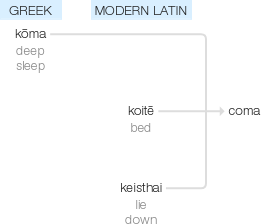Coma
来自Big Physics
mid 17th century: modern Latin, from Greek kōma ‘deep sleep’; related to koitē ‘bed’ and keisthai ‘lie down’.
wiktionary
Borrowed from Ancient Greek κῶμα(kôma, “deep sleep”).
Borrowed from Latin coma(“hair of the head”), from Ancient Greek κόμη(kómē, “hair”).
etymonline
coma (n.1)
"state of prolonged unconsciousness," 1640s, from Latinized form of Greek kōma (genitive kōmatos) "deep sleep," which is of uncertain origin. A term for "coma" in Middle English was false sleep (late 14c.). Related: Comal.
coma (n.2)
"nebulous, hair-like envelope surrounding the head of a comet," 1765, from Latin coma, from Greek komē "hair of the head," which is of unknown origin. Earlier in English as a botanical term for a tuft of hairs (1660s). For the constellation Coma Berenices, see Berenice. Related: Comal.
